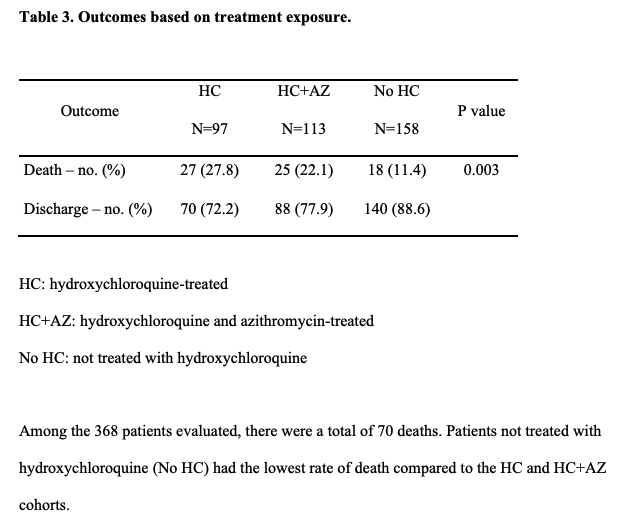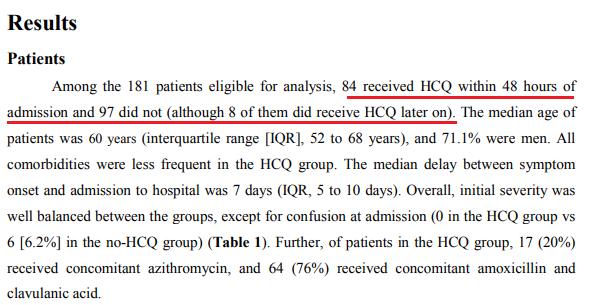The Department of Veterans Affairs' study on the drug hydroxychloroquine…
The Department of Veterans Affairs’ study on the drug hydroxychloroquine was “closer to scientific fraud than reasonable analysis,” according to famed French microbiologist Didier Raoult.
Raoult said some 30 percent of patients in the supposed “control group” were given the antibiotic azithromycin, which is being used to treat the coronavirus, while “nearly dying patients with lymphopenia were treated with hydroxychloroquine.”
The witchhunter @MicrobiomDigest is not attentive to details when she judges that a study is useful to her paranoiac fights!
Control group was treated with azithromycin.
Nearly dying patients with lymphopenia were treated with hydroxychloroquine.
Fraudulent study. Fake news. https://twitter.com/MicrobiomDigest/status/1252650436688965632 …Elisabeth #StayingAtHome #StayingAlive Bik ✔@MicrobiomDigestWow. Preprint on patient group of 368 hospitalized veterans with COVID-19. Hydroxychloroquine treatment: *higher* death rates than treatment without HC.
"Rates of death in the HC, HC+AZ, and no HC groups were 27.8%, 22.1%, 11.4%, respectively."https://www.medrxiv.org/content/10.1101/2020.04.16.20065920v1 …
Regarding the Mahevas study in Medrxiv.
Could the authors explain why 8 patients treated with hydroxychloroquine were counted in the control group?
Moreover, could they inform the public about the clinical outcome of these patients? https://www.medrxiv.org/content/10.1101/2020.04.10.20060699v1.full.pdf …
He released this analysis in response:
In the current period, it seems that passion dominates rigorous and balanced scientific analysis and may lead to scientific misconduct. The article by Magagnoli et al. (Magagnoli, 2020) is an absolutely spectacular example of this. Indeed, in this work, it is concluded, in the end, that hydroxychloroquine (HCQ) would double the mortality in patients with COVID with a fatality rate of 28% (versus 11% in the NoHCQ group), which is extraordinarily hard to believe. The analysis of the data shows two major biases, which show a welling to be convinced before starting the work:
The first is that lymphopenia is twice as common in the HCQ groups (25% in the HCQ, 31% in the HCQ+AZ group versus 14% in the no HCQ group, p =.02) and there is an absolute correlation between lymphopenia (<0.5G/L) and fatality rate, which is well known (Tan, 2020) and confirmed here : 28% deaths, 22% and 11% in the HCQ, HCQ+AZ and No HCQ group, respectively. Lymphopenia is the most obvious criterion of patient severity (in our cohort, lymphocytes in dead individuals (n=22, mean ± standard deviation, 0.94 ± 0.45), versus in the living (n=2405, 1.79 ± 0.84, p < .0001)). As the authors acknowledge, the severity of the patients in the different groups was very different, and their analysis can only make sense if there is a selection of patients with the same degree of severity, i.e. the same percentage of lymphopenia.
The second major bias is that in an attempt to provide meaningful data, by eliminating the initial severity at the time of treatment, two tables are shown: one table where drugs are prescribed before intubation, and which shows no significant difference in the 3 different groups (9/90 (10%) in the HCQ group, 11/101 (10. 9%) HCQ+AZ, and 15/177 (8.5%) in the group without HCQ, chi-square = 0.47, ddl = 2, p = 0.79), and one table, where it is not clear when the drugs were prescribed, where there are significant differences. These differences are most likely related to the fact that the patients had been intubated for some before receiving hydroxychloroquine in desperation. It is notable that this is unreasonable at the time of the cytokine storm, as it is unlikely that hydrochloroquine alone would be able to control patients at this stage of the disease.




You need to be a member of 12160 Social Network to add comments!
Join 12160 Social Network